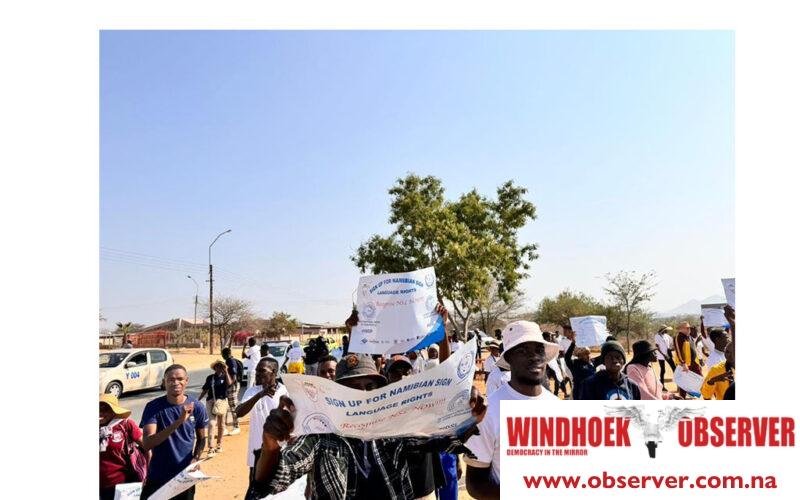Hertta-Maria Amutenja
Politicians are facing criticism for not participating in the Global Leaders Challenge, an initiative by the Namibian National Association of the Deaf (NNAD) to promote sign language rights.
The initiative has been running for three years and has been relaunched on 23 September as part of the 2024 International Day of Sign Languages.
The challenge called on national leaders to advocate for sign language by signing the phrase “A World Where Deaf People Everywhere Can Sign Anywhere” in their national sign language.
However, efforts to engage prominent figures have been met with silence, raising concerns about a lack of support for the Deaf community.
Despite efforts by the national executive director of NNAD, Paulus Nanyeni, to engage national figures such as minister of information and communication technology, Emma Teofelus, Popular Democratic Movement (PDM) leader, McHenry Venaani, and Landless People’s Movement (LPM) member of parliament, Utaara Mootu, the organisation claims their requests were ignored.
“I have tagged them more than enough and hardly respond or share with other leaders to take the challenge,” he said.
Nanyeni also claimed that the ministry of education similarly declined the invitation to participate in International Week of Deaf People (IWDP) and International Day of Sign Languages (IDSL), describing it as an “anti-Deaf tendency” that needs addressing.
Mootu confirmed having come across the request on social media but had not received a formal invitation.
“Yes, I came across it through a social media tag on Twitter, but there was no formal invitation or direct initiative to facilitate the necessary exchange of logistics around the program, which is standard procedure to enhance participation. Upon seeing the tag, I realised I couldn’t take part due to prior commitments on the field, where I was engaging with young people on pressing issues that I later had to present as Chief Whip in parliament the following week,” she said.
Addressing the importance of sign language, Mootu emphasised the importance of promoting national sign languages, noting her advocacy for inclusive education and the prioritisation of individuals living with disabilities in parliamentary debates.
She added that her party’s manifesto which will be launched this weekend calls for the recognition of sign language as part of Namibia’s linguistic landscape.
Minister of Education, Arts and Culture Anna Nghipondokwa refuted Nanyeni’s claims, stating that her office had not turned down the invitation but rather was unable to attend due to prior commitments.
“The invitation was sent to the office of the executive director, who is currently on sick leave. Our team responded that we would not be available. If the invite had been sent to my office directly, I would have arranged for a representative,” Nghipondokwa clarified.
Attempts to contact Emma Teofelus and McHenry Venaani for comment remained unanswered by the time of publication.
At a Cabinet briefing on the matter, Deputy Minister of Disability Affairs, Alexia Manombe-Ncube provided an update on the ministry’s efforts to support persons with disabilities.
Manombe-Ncube highlighted several programmes under the Division of Disability Affairs, including awareness initiatives, access to education, and individual support programmes.
She emphasised that the ministry was committed to ensuring equal access to services such as education, health, and employment for persons with disabilities.
The Global Leaders challenge, which is part of a broader initiative by the World Federation of the Deaf (WFD), aims to promote national sign languages and foster inclusivity worldwide.
The challenge provides an opportunity for governments and civil society to collaborate with national associations of the Deaf to raise awareness and recognize sign languages as essential components of their countries’ linguistic landscapes.
The International Day of Sign Languages was first established by the United Nations General Assembly through Resolution A/RES/72/161 in 2017.
It recognizes 23 September as a day to raise awareness of the importance of sign languages in achieving the full realization of human rights for Deaf people.
The resolution acknowledges the need to protect and promote the linguistic identity and cultural diversity of all sign language users.




